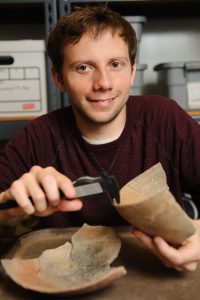TUSCALOOSA, Ala. — Paul Eubanks, a doctoral student in The University of Alabama’s anthropology department, has received an $18,000 Dissertation Improvement Grant by the National Science Foundation for a project that explores the history and impact of the salt trade in northwestern Louisiana during the 18th century.

Eubanks’ project, “Caddo Salt Production in Northwestern Louisiana,” focuses on highlighting the role that the Caddo Indian salt makers played in the development of Louisiana’s history in the post-Columbian world.
“What originally got me interested in the archaeology and history of northwestern Louisiana was salt,” Eubanks said. “Given its limited availability away from coastal areas, participating in the production and trade of salt at inland salt springs would have been a profitable venture for European traders and American Indians alike.”
His interest in pursuing this topic was sparked, in part, by the small number of documented archaeological investigations conducted on the Louisiana salt trade, despite its importance in helping to forge economic and political ties.
“The Caddo salt makers at this site were capable of producing hundreds of pounds of salt each year, which they then traded to the French, Spanish and to other American Indian groups,” Eubanks said. ”Given its role in hide tanning and meat preservation, as well as its dietary use, the high demand for salt would have placed the Caddo salt makers in a unique position of economic power following European contact.”
Dr. Ian Brown, UA professor of anthropology and Eubanks’ faculty adviser, believes that Eubanks is suited to conducting this research.
“Through a series of reading courses at The University of Alabama, he has studied the role of salt on a global basis, both historical and ethnologically,” Brown said. “Also, through course work, he has traced its archaeological expressions among various societies throughout the world.”
To address the topic, a team will conduct excavations at the Drake’s Salt Works archaeological site near Goldonna, La., northeast of Natchitoches. To provide a glimpse into the daily lives of the Caddo salt makers, Eubanks will reconstruct the salt making process at the site.
“By studying the ‘tools of the trade,’ Paul’s exploration of this dynamic period will shed light on other areas of the Southeastern United States where European populations came in contact with native populations who had exclusive access to sources like salt,” Brown said.
The project also examines changes in the intensity of Caddo salt production following sustained contact with French traders and settlers.
The findings from Eubanks’ research, when compared to studies of other societies around the world, will help researchers better understand the relation between economic specialization and the development of economic and political complexity.
The research also stands to benefit the Caddo Nation of Oklahoma, whose ancestors played a critical role in forming the century-long alliance between the Caddo and the Louisiana French.
“This NSF funded research project has great potential in illuminating the story of salt among the Caddo, a story that will most definitely shed light on similar interactions in other regions,” Brown said.
Eubanks is the latest in a series of doctoral students within the UA department of anthropology to be awarded NSF grant funding.
“Paul is our seventh doctoral student to receive an NSF dissertation improvement grant,” said Jason DeCaro, associate professor of anthropology at UA. “This speaks, first and foremost, to his great promise as a scholar and also to the great strength of our young doctoral program.”
UA’s doctoral program in anthropology was approved in 2002.
UA’s department of anthropology is part of the College of Arts and Sciences, the University’s largest division and the largest liberal arts college in the state. Students from the College have won numerous national awards including Rhodes Scholarships, Goldwater Scholarships and memberships on the USA Today Academic All American Team.
Contact
Kristi Payne or Richard LeComte, UA Media Relations, 205/348-3782, rllecomte@advance.ua.edu
Source
Dr. Jason A. DeCaro, 205/348-9061, jdecaro@as.ua.edu